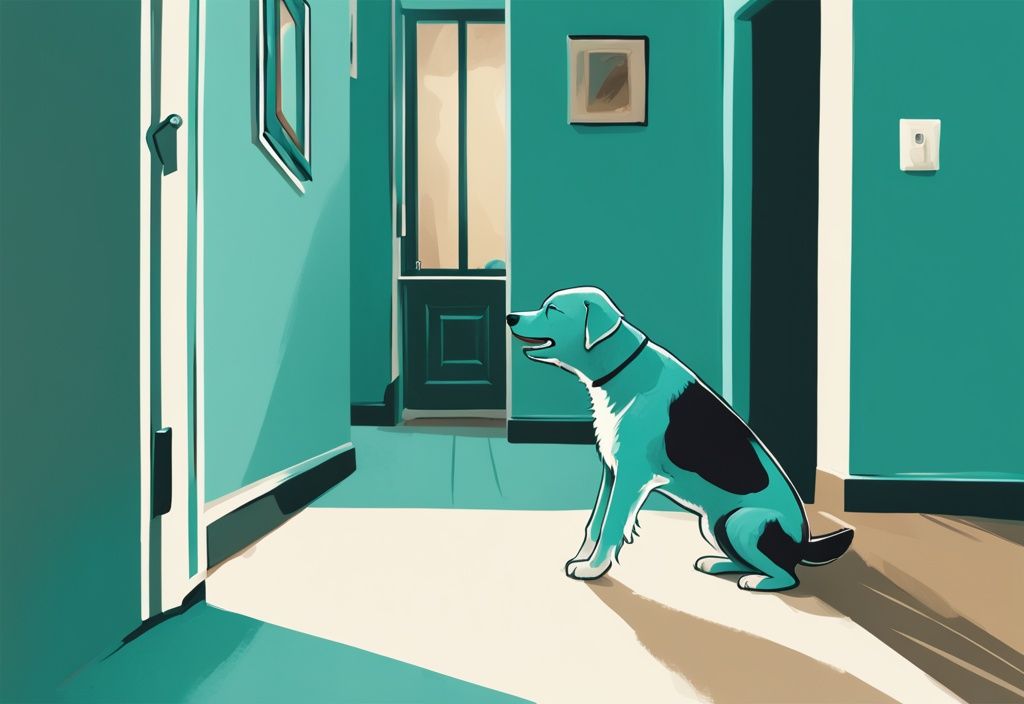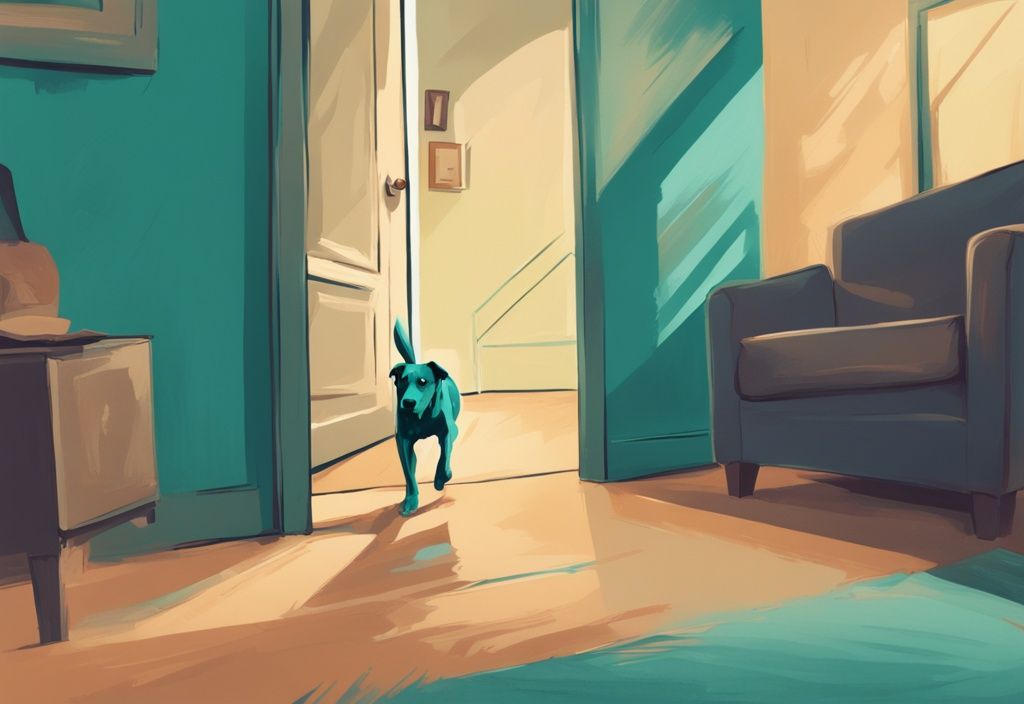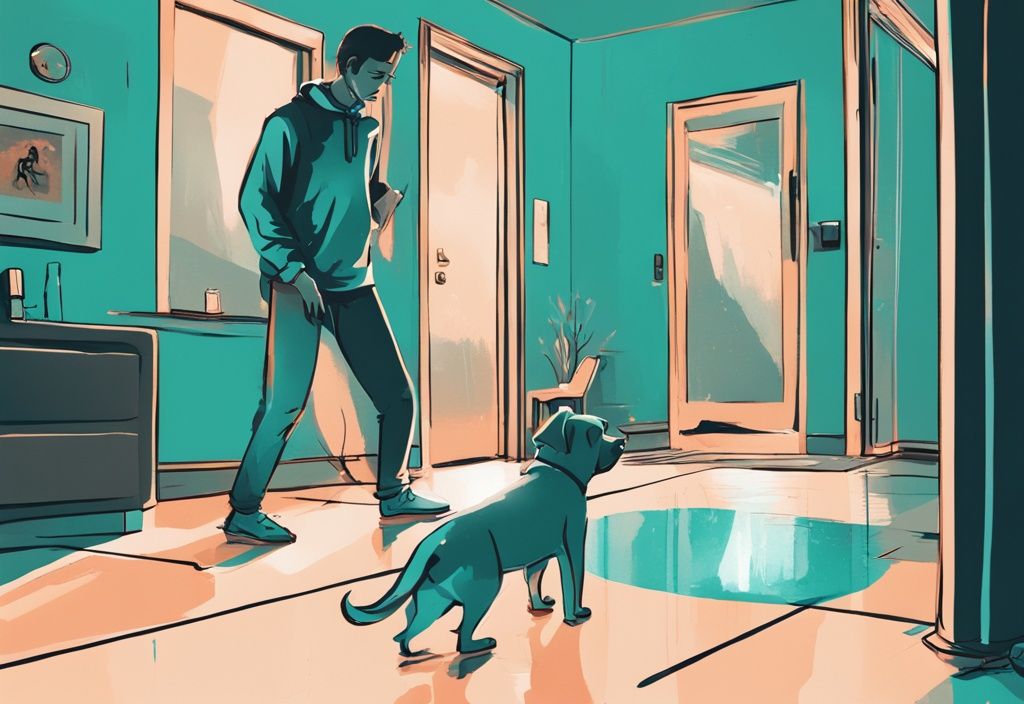Ever catch your precious pooch doing something peculiar and thought, “Why is my dog acting weird?” We’ve all been there, folks! Knowing that our furry friends cannot communicate through words makes their odd behaviours seem like real brain teasers. But fear not! My extensive experience with paw pals, just like my ever-quirky Border Collie, Max, tells me that these eccentricities often hold clues about their wellbeing.
This article will uncover potential reasons behind your dog’s sudden change in behavior – be it erratic aggression, offbeat eating habits, or unusual shaking. You’ll get tried-and-true advice sprinkled with a dash of Lily’s wisdom on understanding and addressing your beloved pet’s behavior.
As we scuttle through this exciting journey together, rest assured, you’ll become an expert in deciphering your canine companion’s antics, ensuring they stay in prime health and happiness. Ready to crack the code, dog lovers? Let’s dive in!
Why is Your Dog Acting Weird? Understanding Strange Behaviors
Sometimes our furry friends act out of sorts, displaying behaviors that leave us scratching our heads. This section delves into the potential reasons behind your dog’s odd conduct and provides tips on how to respond. Understanding these clues can ensure your pup feels safe, happy, and healthy.
Body Language: What Your Dog is Trying to Tell You
Understanding your dog’s body language is essential for discerning their emotions and identifying any potential issues. For more insights on interpreting dog body language, check out this helpful resource on how to read dog body language. Since dogs cannot communicate discomfort verbally, it’s crucial to observe their behavior closely. Pay attention to the onset and symptoms of unusual behaviors, and consider documenting these instances through video recordings for more accurate analysis later.
This can assist your vet in making a diagnosis. Identifying triggers—such as specific environments or stimuli that cause stress—can help you provide a supportive and comforting environment for your pet.
What’s Not Normal: Identifying Unusual Symptoms
Certain behaviors in dogs may indicate underlying issues that need your attention. For instance, excessive panting, yawning, or avoiding eye contact can be signs of anxiety and stress. If your dog, who is normally energetic, suddenly becomes lethargic, it could indicate an illness, injury, or severe anxiety.
Similarly, snapping or growling, especially when unprovoked, could point to physical or emotional pain. One particularly alarming symptom to watch for is head pressing against surfaces, as this can be a sign of severe health problems like brain disease or toxic poisoning.
When to Involve the Vet: Warning Signs
Noticing strange behavior in your dog can be worrying, and knowing when to contact a vet can make all the difference. Immediate veterinary intervention is crucial when bizarre behaviors arise, to prevent any potential worsening of health conditions.
Look out for behaviors such as vomiting, diarrhea, frequent episodes, visible injuries, or signs your dog may have ingested toxic substances. In situations where breathing difficulties are present, you might wonder how to give your dog oxygen at home. An early diagnosis and treatment plan can help resolve behavioral issues promptly, maintaining your dog’s health and your positive relationship with them.
Dog Acting Strange? Common Triggers Behind Odd Behavior
Ever find yourself scratching your head and asking, “Why is my dog acting weird?” You’re not alone! There are several reasons why our furry friends might exhibit strange behaviors, and understanding these can help you get to the bottom of the issue.
Health Issues that Cause Strange Dog Behavior
Common Canine Illnesses and Their Symptoms
When pondering the question, “why is my dog acting weird,” it’s crucial first to consider potential health problems. Disorders like canine dementia, inner ear issues, and hormonal imbalances can significantly affect a dog’s behavior.

For instance, if your dog suddenly displays uncharacteristic aggression, it might be a sign of brain tumors. Canine distemper is another culprit, manifesting through symptoms such as shaking, coughing, and seizures. Additionally, gastrointestinal problems, liver or kidney issues, or diabetes often reveal themselves with bad breath, adding another layer of complexity to your dog’s behavior.
Environmental Changes that Can Affect Your Dog
Environmental shifts often leave dog owners asking, “why is my dog acting weird?” Dogs are creatures of habit, and routine disruptions can cause considerable distress.
Moving to a new home, changes in family dynamics, or the loss of a companion can trigger stress and depression. Additionally, extreme temperatures can impact your dog’s well-being; high heat can lead to heatstroke, causing disorientation and abnormal behavior. Recognizing these triggers can help in mitigating stress and maintaining your dog’s emotional health.
The Impact of Diet and Routine on Your Dog’s Behavior
Dietary changes rank high on the list when addressing the query “why is my dog acting weird.” Sudden alterations in food can disturb a dog’s digestive system, making them feel unwell and behave strangely.
Equally important is maintaining regular exercise. A lack of physical activity can lead to boredom, resulting in destructive behavior. By keeping a stable routine and offering ample mental and physical stimulation, you can help your dog maintain balanced and predictable behavior patterns.
Emotional Factors: Can Stress and Anxiety Cause Weird Behavior in Dogs?
Emotional well-being is another critical aspect to consider when your dog starts acting out of the ordinary.
Stress and anxiety can manifest in behaviors like excessive barking, zoomies, or frequent yawning. Separation anxiety is a common issue, especially for dogs left alone for extended periods, often resulting in destructive actions and incessant barking.
Emotional distress can also stem from significant changes in the environment or a lack of social interaction, leading to anxiety or depression. Understanding these emotional triggers helps in addressing the root cause of your dog’s strange behavior. Additionally, if you’re curious about why your cat might exhibit unusual behaviors, such as scratching the mirror, exploring these triggers in cats can be similarly beneficial.
Invalid YouTube video ID
Specific Weird Dog Behaviors and What They Could Mean
Shaking, Panting, Yawning: What are They Signaling?
Ever caught yourself puzzling over, “why is my dog acting weird?” Shaking, panting, and yawning might just give you some hints. When Max, my Border Collie, shakes like he’s doing the cha-cha or pants faster than I can say “treat,” it’s often a telltale sign of stress or anxiety. Thunderstorms or loud noises can send him into a tizzy. But don’t discount these signs – they might also whisper secrets of pain, discomfort, or even poisoning. If your furball is shaking regularly without any clear reason, it might be a red flag for health issues like seizures or epilepsy, which often come with drooling and loss of consciousness.

And then there’s yawning. Unlike us, dogs don’t yawn because they’re sleepy (most of the time). If Whiskers, my rescue cat, starts yawning incessantly, it’s usually a sign of stress or discomfort. Keep an eye out for frequent yawning; it might be your pup’s way of signaling anxiety. Observing these behaviors can pinpoint stressors and help mitigate them.
Aggression, Fear, and Growling: Understanding Your Dog’s Mood Shifts
When Max starts growling or showing his teeth, I immediately think, “why is my dog acting weird?” Such sudden mood swings can be bewildering. These behavior shifts might be your dog’s way of saying, “I’m stressed, hurt, or scared.” Fear can make even the friendliest dogs growl or snap, especially around strangers or after a frightful event. Identifying and understanding these triggers are essential for creating a safe and calm haven for your fur buddy.
Aggression can often sprout from physical or emotional scars. Chronic pain or traumatic past experiences can turn a sweet pup into a cranky one. Early signs of aggression should be taken seriously – consulting a vet or a behaviorist can offer strategies to manage and soothe these behaviors.
Lethargy or Hyperactivity: The Whys Behind Energy Level Changes
One moment, Max is dashing around with boundless energy, and the next, he’s a couch potato, making me wonder, “why is my dog acting weird?” A usually lively pup suddenly turning lethargic could be signaling food poisoning, allergic reactions, or hidden illnesses. Keeping a close watch on their diet and any potential harmful ingestions is crucial.
On flip side, have you ever witnessed the “zoomies”? That sudden burst of frenetic energy is often seen in dogs who are releasing pent-up excitement or simply having a blast. While these zoomies are generally normal, maintaining a balanced routine with regular exercise can help keep your pup’s energy levels steady and their spirits high.
Unusual Eating and Bathroom Habits: When Should You Worry?
If Max starts eating poop, I can’t help but think, “why is my dog acting weird?” Though gross, it can be rooted in survival instincts, malabsorption issues, or stress. A vet visit is essential to rule out nutritional deficiencies or health problems.
Constant paw licking could mean allergies, skin irritations, or even stress. Monitoring Max’s habits and checking for allergens in his environment can help address these issues.
And let’s not forget bathroom habits. Any unexpected changes, especially in house-trained dogs, might indicate stress, aging, or medical conditions. Sudden bathroom behavior changes definitely warrant a closer look and possibly a vet consultation to ensure your pet’s well-being.
Adopting Effective Measures: How to Deal with Your Dog’s Odd Behavior
Addressing your dog’s strange behavior requires a multi-faceted approach, from creating safe spaces to understanding the importance of routine and when to seek professional help. Let’s delve into each of these areas to help your furry friend feel more at ease.
Creating Safe Spaces for Your Pet
Providing a secure and hazard-free environment for your dog is essential when pondering, “why is my dog acting weird?” Dogs are highly sensitive to their surroundings. Start by removing potential dangers like toxic plants, sharp objects, and small items that could be swallowed. Designate a quiet, cozy area in your home where your dog can retreat when feeling anxious or overwhelmed. This safe space should include their favorite toys, a comfortable bed, and minimal exposure to stressful stimuli. Additionally, shower your dog with affection and praise to create positive associations and reinforce good behavior.
The Importance of Caring for a Dog’s Etiquette and Routine
Maintaining a stable routine is crucial when managing unusual dog behaviors. Dogs thrive on consistency, so establishing a regular schedule for feeding, walking, and playtime can prevent anxiety and confusion. Mental stimulation through puzzle toys, training exercises, and interactive games is also vital. Gradual transitions during changes in routine or environment help reduce stress. Positive reinforcement through treats, verbal praise, and physical affection strengthens your bond and promotes desirable behavior. Lastly, be sensitive to routine disruptions and address them promptly to ensure your dog feels secure and understood.
When to Consult with Professional Dog Behaviorists
Sometimes, answering the question “why is my dog acting weird” calls for professional intervention. Collaborating with a certified veterinary behaviorist is an excellent option for developing tailored training and behavioral plans. Professional dog behaviorists and trainers offer invaluable expertise, helping you tackle chronic or severe behavioral issues effectively. Patience and consistency are paramount: follow the recommended training or treatment plans diligently and allow ample time for your dog to adjust and respond. Investing in professional help can lead to profound improvements in your pet’s well-being and your relationship with them.

Conclusion: Understanding Your Dog’s Strange Behavior Is Important
Recognizing and addressing the reasons why is my dog acting weird is absolutely vital for their well-being. It also helps build that unbreakable bond between you and your furry friend. Have you ever noticed how dogs are expert communicators, even without words? They use body language and quirky actions to tell us what’s up. Sometimes, these signals are easy to misinterpret if we’re not paying close attention.
By being alert to any sudden or unexpected changes in your dog’s behavior, you can gain critical insights into their health. Imagine Max, my energetic Border Collie, suddenly acting lethargic. That’s a big red flag! It’s essential to observe these shifts because they can indicate underlying physical or mental distress.
Monitoring your dog’s behavior closely is key. Jot down anything unusual, like excessive panting, compulsive yawning, or sudden lethargy. Videos and detailed notes are fantastic tools to give your vet a complete picture, helping them diagnose any issues accurately.
Understanding the potential causes of strange behaviors is crucial. Whether your dog is reacting to changes in their environment, diet, or dealing with hidden health issues or emotional stress, pinpointing what makes you ask, why is my dog acting weird helps in addressing these triggers early on. Quick veterinary care can mitigate health risks, ensuring your pup stays happy and healthy.
In the end, knowing your dog’s quirks and subtleties enhances your bond. It lets you provide a nurturing environment that meets their needs. By staying vigilant and informed, you ensure your dog’s overall health and safety, nurturing a loving and harmonious relationship. Isn’t that what being a pet parent is all about?
Frequently Asked Questions About Strange Dog Behavior
Why does my dog shake if they are not cold?
– Oh boy, if Max started shaking and it wasn’t chilly, I’d be a worried pet mom! Your dog might be shaking due to anxiety, stress, pain, or even discomfort. Sometimes, poisoning or various health conditions can also be culprits. Injuries, arthritis, or internal issues like pancreatitis often trigger shaking. Ever heard of Generalized Tremor Syndrome (GTS)? It’s a condition that causes full-body tremors, especially in small breeds. Phew, there’s so much that could be going on!
How do I detect signs of anxiety in my dog?
– Spotting anxiety in your furry friend can be a bit of a puzzle, but there are some tell-tale signs! If your dog is panting, yawning a lot, making less eye contact, or being destructively naughty, they could be feeling anxious. Excessive barking, whining, and pacing are also clues. Does your dog tuck their tail? That might mean they’re scared, anxious, or submissive. Oh, and constant paw licking? It’s often a stress signal—or maybe allergies. Keep an eye out!
Is it normal for dogs to eat things that aren’t food?
– This one brings back memories of Max munching on my socks! While it can be somewhat normal, dogs might eat non-food items due to malabsorption diseases, nutritional deficiencies, or stress. Eating poop could be a survival instinct (gross, I know!), and munching on grass might be hereditary or tied to a nutritional gap. When dogs ingest unusual stuff, it might signal anxiety, stress, or even behavioral quirks.
What could cause my dog to become suddenly aggressive?
– Imagine if Max suddenly turned aggressive—yikes! Sudden aggression can stem from illness, injury, discomfort, or emotional distress. Sometimes, fear or past traumas are the culprits. Even brain tumors can spark such drastic personality changes and aggression. So, don’t shrug off sudden aggression; it’s a big red flag about your dog’s well-being.
Should I be worried if my dog behaves differently after surgery?
– Post-surgery blues are totally a thing to keep an eye on! Behavioral changes after surgery or medical treatments can be due to side effects or pain. Medications prescribed post-surgery can also mess with a dog’s behavior. If your furry buddy’s odd behavior sticks around, it’s definitely worth consulting your vet. Better safe than sorry!
Can a change in diet cause behavior shifts in dogs?
– Oh yes, dietary shifts can really affect our canine companions! A sudden change in diet can upset their digestive system, which might lead to some weird behavior. Malabsorption diseases or nutritional deficiencies can also contribute to this. Keeping their diet consistent and watching for any adverse reactions is crucial for their well-being. It’s all about balance and monitoring!
